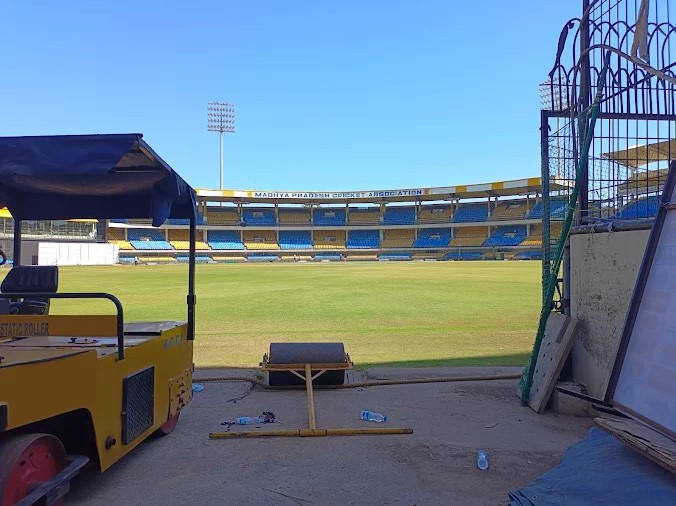Holkar Cricket Stadium, located in Indore, Madhya Pradesh, is one of India’s most electrifying venues. Known for its batting-friendly pitch, quick outfield, and high-scoring encounters, the stadium has hosted several thrilling domestic and international matches. A unique aspect of Holkar Stadium is its relatively small boundary lengths, which significantly influence the style of play, making it a favorite for batsmen and a challenging ground for bowlers.
Table of Contents
Stadium Overview
| Feature | Detail |
|---|---|
| Location | Indore, Madhya Pradesh, India |
| Established | 1990 |
| Seating Capacity | Approx. 30,000 |
| Ends | Pavilion End, Railway End |
| First International Match | ODI in 2006 |
| Home Team | Madhya Pradesh, India (selected matches) |
Boundary Dimensions
The boundary sizes at Holkar Cricket Stadium are smaller compared to many other international venues. This characteristic has contributed to numerous high-scoring games and quick centuries. The average boundary lengths are as follows:
| Boundary Type | Length (approx.) |
|---|---|
| Straight | 70-72 meters |
| Square | 56-60 meters |
| Fine Leg/Third Man | 58-60 meters |
| Mid-wicket/Extra Cover | 62-65 meters |
Key Observations:
- The straight boundary is the longest, yet still within the average international standards.
- Square and fine leg boundaries are among the shortest in international cricket.
- The small boundaries, combined with a flat pitch, make the ground ideal for aggressive batting.
Impact on Gameplay
1. Batsman’s Paradise
Small boundary lengths encourage aggressive stroke play. Batsmen are more confident in taking aerial shots, knowing that the ball is likely to clear the ropes. This often results in high run rates and big totals.
- Example: Rohit Sharma scored 118 off 43 balls here in 2017, showcasing the ease with which big shots can be played.
- The stadium has seen team scores consistently cross 300 in ODIs and 200 in T20s.
2. Bowlers’ Challenge
- Fast bowlers try to bowl full or into the body to prevent batsmen from freeing their arms.
- Spinners need to vary pace and flight to induce mistimed shots.
| Format | Average First Innings Score |
|---|---|
| ODI | 320+ |
| T20I | 200+ |
| IPL | 180+ |
3. Fielding Strategy
Captains often deploy boundary riders early in the innings to cut down on boundaries. Ground dimensions demand quick fielders who can anticipate and cover ground swiftly.
Comparison with Other Indian Grounds
| Stadium | Straight Boundary | Square Boundary |
|---|---|---|
| Holkar (Indore) | 70-72 m | 56-60 m |
| Eden Gardens (Kolkata) | 76-78 m | 66-70 m |
| Wankhede (Mumbai) | 72-74 m | 63-65 m |
| M. Chinnaswamy (Bengaluru) | 68-70 m | 58-60 m |
Memorable Matches and Records
Some historic and high-scoring encounters have taken place at Holkar, aided by its boundary dimensions:
- India vs. Sri Lanka, 2017 (T20I): India scored 260/5, then the second-highest T20I score at the time.
- India vs. West Indies, 2022 (ODI): A run fest where the hosts chased down a big total comfortably.
- Rohit Sharma’s T20I century (2017): Fastest T20I century (35 balls) at the time, exploiting short boundaries.
Criticisms and Concerns
While fans love the fireworks, some cricket purists and analysts have raised concerns:
- Unfair to Bowlers: The small dimensions tilt the balance heavily in favor of batsmen.
- One-Dimensional Matches: Matches can become predictable, with less emphasis on tactical bowling and more on power-hitting.
- Global Comparison: When compared to grounds like the MCG or Lord’s, Holkar appears unusually compact for an international venue.
Future Developments
- Preparing dual-paced pitches to add variety.
- Using boundary ropes strategically within ICC regulations to slightly increase effective dimensions.
Holkar Cricket Stadium is undoubtedly one of the most entertaining cricket venues in India. Its compact size and short boundary lengths have made it a hub for modern, fast-paced cricket. While it may not be the best friend of bowlers, it offers fans non-stop action and unforgettable memories. As the game evolves, such stadiums reflect the changing dynamics of cricket—favoring power-hitting, quick reflexes, and aggressive gameplay.
Whether you’re a fan of towering sixes or worried about the declining art of spin bowling, there’s no denying the role Holkar Stadium plays in shaping contemporary cricket in India.


